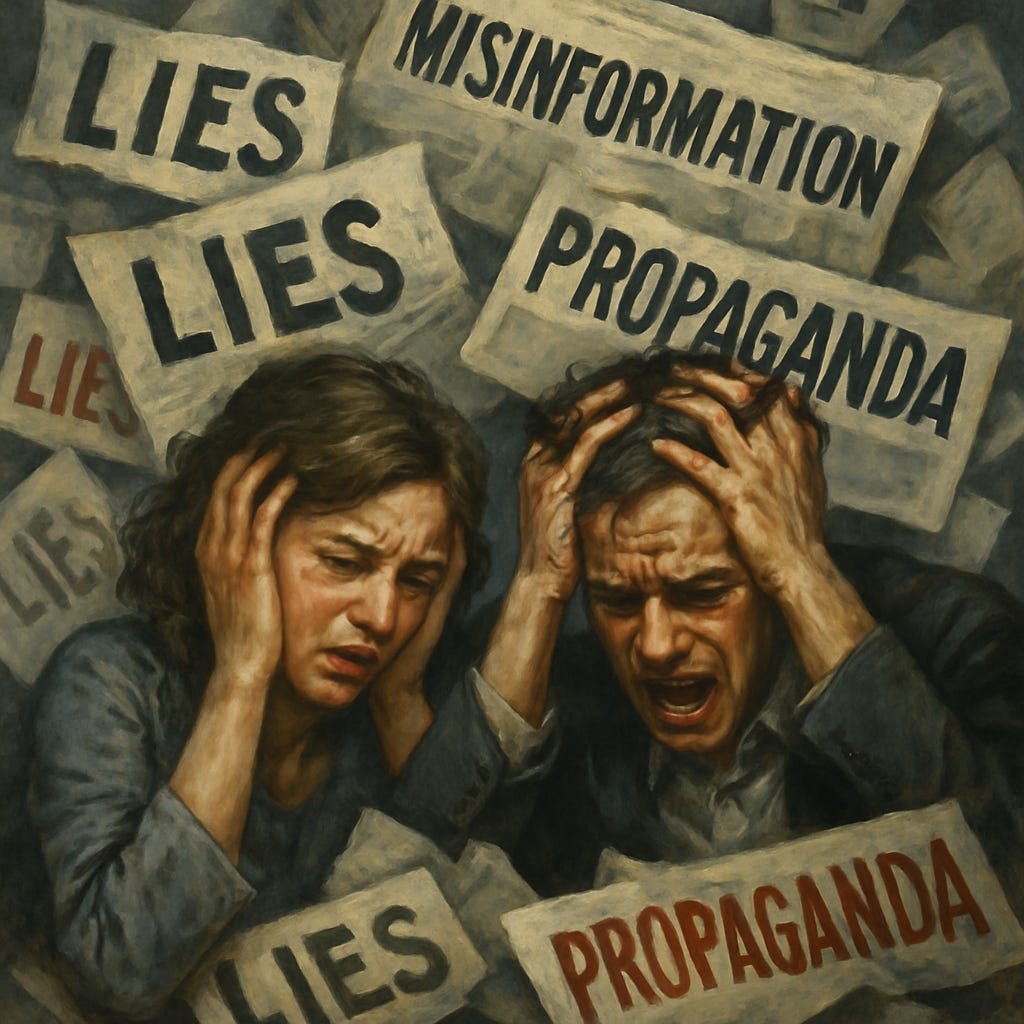Information Pollution
The Psychological Impact of Living in an AI-Hallucinated Reality
In the previous post in this series I discussed the danger to society as a whole from the phenomenon of AI hallucinations–highly plausible but fabricated outputs. Apart from the highly negative cultural consequences, it also produces a profound psychological challenge to us as individuals.
It is becoming harder and harder to be able to distinguish lies from reality. We are losing the ability to be able to rigorously verify what we are being told. Trust for information sources of all kind is being eroded. This induces mental conflict which leads to an inevitable sense of disconnection from reality. The proliferation of seemingly authentic misrepresentations of reality attack our fundamental belief systems–the very ones that allow us to act in good faith. We need that sense of belief to take action because the world is not, nor ever will be, wholly knowable. The quality of the information we use to make important decisions has to be of the best quality possible. We have to predict outcomes to function in the world but without a solid basis of truth from which to operate we are groping in the dark.
The mechanics of repeated exposure to misinformation can turn false beliefs into a sense of the truth. The brain eventually gives up on trying to distinguish fact from fiction as it is just too exhausting to maintain vigilance over time. The accumulated cognitive strain results in the undermining of confidence in our ability to discern truth.
Truth is the primary requirement from the information they receive. They rely on heuristics to assess credibility. When we receive convincing but false narratives it results in cognitive dissonance—a human cognitive vulnerability that causes discomfort when beliefs clash with contradictory evidence. To resolve this issue we, after repeated exposure, end up adopting the new belief, whether it is true or not. This process of gaslighting is how totalitarian propaganda works.
"'Who controls the past,' ran the Party slogan, 'controls the future: who controls the present controls the past.' And yet the past, though of its nature alterable, never had been altered. Whatever was true now was true from everlasting to everlasting. It was quite simple. All that was needed was an unending series of victories over your own memory. 'Reality control', they called it: in Newspeak, 'doublethink'." George Orwell, 1984
Another unpleasant consequence is the fostering of unjustified cynicism. This creates unnecessary doubt in human institutions such as the government, law, education, the security services, and the family. All of them have their problems but their inherent issues can never be resolved if we acting on the wrong information and behaving with the wrong attitude. Intellectual paralysis, complacency and withdrawal because of lack of belief, is not how good things get done.
But the real evil is that this distrust extends to interpersonal interaction. If you are not sure yourself as to what is true, how can you trust anyone else?
Gordon Pennycook and David G. Rand in 'Fighting Misinformation on Social Media Using Crowdsourced Judgments of News Source Quality' highlight how misinformation erodes trust not only in specific sources but in the media as a whole.
"First, it is not at all clear that laypeople are well equipped to assess the reliability of news outlets. For example, studies on perceptions of news accuracy revealed that participants routinely (and incorrectly) judge around 40% of legitimate news stories as false, and 20% of fabricated news stories as true (7, 13–15). If laypeople cannot effectively identify the quality of individual news stories, then they may also be unable to identify the quality of news sources."
When individuals cannot trust news, academic resources, or even AI assistants, they may disengage from information-seeking altogether. The hyper-vigilance necessary to operate in a world of lies can be very taxing on an individual's mental health.
Claire Wardle and Hossein Derakhshan in their report 'Information Disorder: Toward an Interdisciplinary Framework for Research and Policy Making' make the case that a consequence of being surrounded by misinformation creates a toxic environment that overwhelms individuals with conflicting narratives which cannot be reconciled.
"We are witnessing something new: information pollution at a global scale; a complex web of motivations for creating, disseminating and consuming these ‘polluted’ messages; a myriad of content types and techniques for amplifying content; innumerable platforms hosting and reproducing this content; and breakneck speeds of communication between trusted peers."
Over time, this ecological crisis for the mind can lead to existential anxiety, as people grapple with a reality that feels unmoored. The long-term mental health implications are significant. Chronic exposure to AI-driven uncertainty can exacerbate anxiety and depression, particularly among those already vulnerable.
To repeat the danger: persistent misinformation exposure can bring about heightened stress, as we use precious mental energy to verify information or reconcile contradictions. This cognitive load burns some of us out, opening us up to the negative effects of other stressors, snowballing to crisis. Communities need a shared basis of ideas from which to function. Without communal values to hold us together we are headed to a life of loneliness, insecurity and incipient paranoia.
Background Reading:
Pennycook, G., & Rand, D. G. (2019). “Fighting Misinformation on Social Media Using Crowdsourced Judgments of News Source Quality.” Proceedings of the National Academy of Sciences.
Wardle, C., & Derakhshan, H. (2017). “Information Disorder: Toward an Interdisciplinary Framework for Research and Policy Making.” Council of Europe Report.
Ecker, U. K. H., et al. (2022). “The Psychological Drivers of Misinformation Belief and Its Resistance to Correction.” Nature Reviews Psychology.
Swire-Thompson, B., & Lazer, D. (2020). “Public Health and Online Misinformation: Challenges and Recommendations.” Annual Review of Public Health.
George Orwell, 1984.



